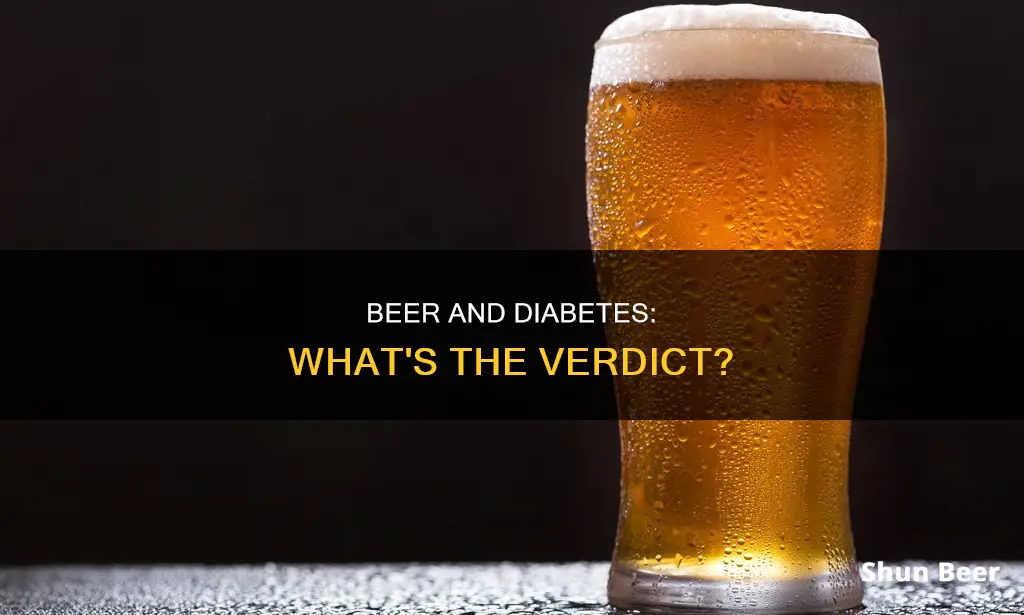
Beer is a popular alcoholic drink, but is it a good choice for people with diabetes? Alcohol can affect blood sugar levels and interact with diabetes medications, so it's important for diabetics to understand the impact of beer on their health. Beer contains carbohydrates and can impact blood sugar levels, especially in larger quantities. It also tends to be high in calories, which may contribute to weight gain over time. However, moderate consumption of beer, defined as one drink per day for women and up to two drinks per day for men, is generally considered safe for people with diabetes. Light beers are recommended as they have lower carbohydrate and calorie content. Additionally, drinking beer with food and staying hydrated can help mitigate some of the negative effects of alcohol on blood sugar levels. While beer can be enjoyed as part of a balanced lifestyle, excessive consumption may lead to health complications for diabetics.
| Characteristics | Values |
|---|---|
| Alcohol content | Low |
| Calorie content | High |
| Carbohydrates | 13 grams on average |
| Vitamins and minerals | Contains small amounts of B vitamins, calcium, magnesium, and phosphorus |
| Blood sugar impact | Can cause hypoglycemia (low blood sugar) |
| Recommended intake | Moderate consumption (one drink per day for women, two drinks per day for men) |
| Risks | Weight gain, interference with diabetes medications, increased risk of diabetes-related complications |
What You'll Learn
- Beer is a source of carbohydrates and can impact blood sugar levels
- Drinking beer may contribute to weight gain due to its calorie content
- Alcohol can slow down carb metabolism and lead to low blood sugar
- Beer is typically higher in carbs than other alcoholic drinks
- Drinking beer in moderation is generally safe for diabetics

Beer is a source of carbohydrates and can impact blood sugar levels
Because beer contains carbohydrates, it can significantly affect blood sugar levels and must be treated accordingly. When you have diabetes, your body struggles to get sugar into your bloodstream for your cells to use. This can lead to hyperglycaemia, a state where there is too much sugar in the blood, which can damage organs and body tissues. Beer, as a source of carbohydrates, can contribute to hyperglycaemia.
Additionally, drinking alcohol can cause hypoglycaemia, or low blood sugar. This is because the liver, which stores glucose, is also responsible for clearing alcohol from your system, and may be delayed in releasing necessary sugars into the bloodstream. Beer, as a source of carbohydrates, can contribute to this effect as the liver prioritises clearing alcohol over releasing glucose.
Therefore, it is essential for people with diabetes to be mindful when consuming beer. Drinking in moderation, not drinking on an empty stomach, and monitoring blood sugar levels are recommended practices to ensure blood sugar levels stay within a healthy range.
The Pros and Cons of IPA Beer Consumption
You may want to see also

Drinking beer may contribute to weight gain due to its calorie content
Beer is made from fermented grain, and the calories in beer come mainly from carbs and alcohol. The calorie content of beer varies depending on the type, with craft, seasonal, and high-alcohol beers generally containing more calories than lighter beers. For example, a 12-ounce serving of Budweiser has 145 calories, while a Budweiser Select has only 55 calories.
Drinking beer in moderation is generally considered safe for people with diabetes, but it's important to be mindful of how it can affect blood sugar levels and contribute to weight gain. Beer is a significant source of carbohydrates, and depending on the type, it can also be high in calories. For instance, a 12-ounce can of beer typically contains 13 grams of carbohydrates.
The body prioritises clearing alcohol from the body, which means that drinking alcohol can slow down carb metabolism. This can lead to low blood sugar (hypoglycemia), especially if drinking on an empty stomach. Additionally, alcohol is a toxin that is fast-tracked to the liver, which can lead to a build-up of fatty substances and liver disease if consumed in excess.
The high-calorie content of beer, coupled with its impact on carb metabolism, means that drinking beer may contribute to weight gain over time. This is especially true for beers with a higher alcohol content, as alcohol itself has more calories per 100 milliliters than carbs. Therefore, it's important for people with diabetes to be mindful of the calorie content of beer and to consume it in moderation to avoid potential weight gain and other health complications.
Beer for Hair: Healthy Shine or Foamy Disaster?
You may want to see also

Alcohol can slow down carb metabolism and lead to low blood sugar
Alcohol can affect blood sugar levels in people with diabetes. The liver is responsible for stabilising blood glucose levels by storing carbohydrates and releasing them into the bloodstream. It also metabolises alcohol. However, the liver is not good at multitasking, so when alcohol is present, it will prioritise metabolising it over maintaining blood glucose levels. This can lead to hypoglycaemia, or low blood sugar.
The risk of hypoglycaemia is increased when drinking alcohol on an empty stomach, as the liver has no food to convert into glucose. This is why it is recommended that people with diabetes eat before drinking alcohol. It is also important to monitor blood sugar levels before, during, and up to 24 hours after drinking alcohol, as hypoglycaemia can occur many hours after the last drink.
The symptoms of hypoglycaemia can be similar to those of drunkenness, such as slurred speech, drowsiness, and confusion, which can make it difficult to tell the two conditions apart. Alcohol can also impair judgement, so a person with diabetes may not realise that their blood sugar is low. This makes it even more important to monitor blood sugar levels when drinking alcohol.
In addition to slowing down carb metabolism, alcohol can also interfere with the effectiveness of diabetes medications, particularly insulin. This can further increase the risk of hypoglycaemia. Therefore, it is important for people with diabetes to be cautious when consuming alcohol and to follow recommendations for moderate drinking.
Beer and Kidney Health: Exploring the Connection
You may want to see also

Beer is typically higher in carbs than other alcoholic drinks
The carb content of beer can vary widely depending on the type. "Light" beers tend to have the fewest carbs, usually 5 grams or less per 12-ounce serving. They also tend to be lower in alcohol content. Craft beers like IPAs and stouts, on the other hand, can contain 15 grams or more of carbohydrates per serving. They also tend to be higher in calories and alcohol content, so it's best to stick to just one serving.
The high carb content of beer is worth noting for people with diabetes, as carbohydrates can significantly impact blood sugar levels. Beer also contains very small amounts of vitamins and minerals such as B vitamins, calcium, magnesium, and phosphorus.
When it comes to diabetes, it's important to note that alcohol can interfere with the liver's ability to produce glucose, which can lead to hypoglycemia. Therefore, people with diabetes who choose to drink beer should be mindful of their blood sugar levels and consume in moderation.
Champagne vs Beer: Which is the Healthier Choice?
You may want to see also

Drinking beer in moderation is generally safe for diabetics
Blood Sugar Management
Beer can impact blood sugar levels due to its carbohydrate content. A typical 12-ounce can of beer contains approximately 13 grams of carbohydrates. As a result, drinking beer may cause a spike in blood sugar levels, especially if consumed on an empty stomach. To minimise this effect, it is recommended to drink beer with a low-carbohydrate snack or opt for light beers with lower carbohydrate and calorie counts.
Alcohol's Impact on the Body
Alcohol interferes with the liver's ability to regulate blood sugar. The liver, which usually stores and releases glucose as needed, is occupied with clearing alcohol from the body. This can lead to a delay in releasing necessary sugars into the bloodstream, resulting in low blood sugar or hypoglycaemia. The risk of hypoglycaemia increases after drinking and can last up to 24 hours. Additionally, drinking on an empty stomach or excessive alcohol consumption can further elevate this risk.
Guidelines for Safe Consumption
It is crucial to follow recommended guidelines for alcohol consumption. For women, it is advised to limit intake to one drink per day, and for men, up to two drinks per day. These guidelines apply to people with diabetes as well. It is also important to be mindful of the type of beer consumed. Low-sugar beers might have less sugar but often contain more alcohol. Therefore, it is generally recommended to opt for light beers with lower alcohol and carbohydrate content.
Additional Considerations
People with diabetes should also be aware of the symptoms of hypoglycaemia, as they can be similar to those of intoxication. It is advisable to inform those around you of these signs to ensure they can provide assistance if needed. Additionally, always carry hypo treatments and wear medical ID when drinking. Monitoring blood sugar levels before, during, and after drinking is also essential for people with diabetes.
Vodka vs Beer: Which Alcoholic Drink is Healthier?
You may want to see also







